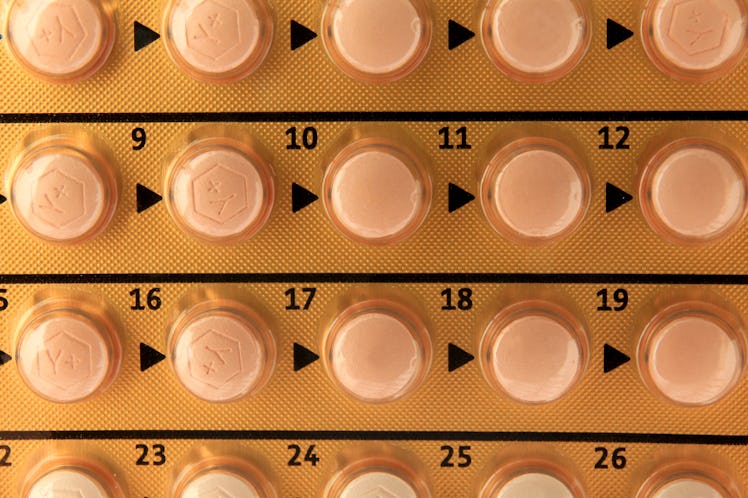
7 Myths You've Been Told About Your Birth Control That Actually Make No Sense
Birth control is hands-down the greatest invention since sliced bread. It allows women to maintain control of their reproductive choices, keeps troublesome periods in check, and often serves to regulate your hormonal flow in general, helping you manage problems like acne, mood swings, and more. But for every true benefit that birth control provides us, there are plenty of myths about birth control we've all heard, too.
Spoiler alert: Those myths are exactly that — myths. And the more we circulate them around as half-truths, the more likely young women are to potentially believe them and choose to abstain from birth control for fears that aren't even scientifically justified.
According to a 2016 report from the Guttmacher Institute, approximately 62 percent of women of a childbearing age are consistently using some form of contraception. This number, though promising, has the power to shoot way, way up if we're clearer with ourselves and each other about what birth control is and isn't. What it is is a supremely safe and healthy decision about how to approach your sex life and your menstrual cycle. What it isn't is a fertility-ruining, complication-causing nightmare of scheduling and confusion.
With so many political and socioeconomic factors bearing down on the right for all women to have safe and effective contraceptives, it's up to us to be as educated as possible so that we can advocate for our reproductive freedom. Here are seven myths about birth control that are just plain untrue.
01Birth Control Has A Harmful Amount Of Hormones
Birth control is not some relentless firehose of hormones that sprays your system willy-nilly. Rather, different types of contraceptives vary in the concentration and release of hormones to your system, depending on what you need.
For example, the pill contains estrogen and progesterone hormones, while the copper IUD is an entirely non-hormonal form of birth control that actually works on its own to repel sperm, because science is neat like that.
02You'll Definitely Gain Weight On Birth Control
One of the most common complaints and arguments about using birth control is that it will make you gain a ton of weight. Not only is this untrue, but it varies so much on a case-by-case basis that the effects of your contraceptive should be a topic you discuss with your doctor, not one that you solve via an internet search.
Most birth control is, at its base, a form of hormonal regulation, so of course there's a chance that your body will be affected by the changes in your system, in the same way any medication can affect your body. But there's no direct correlation between birth control and weight gain. However, you can always switch contraceptive choices (or maybe opt for a non-hormonal form of birth control) if there are changes to your body that you're not cool with.
FYI: If you're someone who has gained a little weight from using your birth control, don't be so quick to think this is necessarily a bad thing. If you're feeling happy and healthy, there's no reason to switch your contraceptive.
03Birth Control Can Mess With Your Fertility
Let's keep this one simple: There is not one iota of scientific proof that consistent use of birth control will harm or hinder a woman's long-term fertility.
In fact, research has shown that women who ditched the pill got pregnant just as quickly and with the same percentage of success as those who hadn't been on birth control.
04You Should Take A Break From Birth Control Every So Often
Another prevailing myth about birth control is that it's important for you to go off of any type of contraceptive every few years to "reset your body."
The truth is that there's no reason to take "breaks" from contraceptives. Your body simply doesn't need to take time off from birth control. However, if you're experiencing significant, harmful differences in your body, like mood swings, for example, that might be a reason to speak with your doctor about switching contraceptives so you can feel better overall.
05Only People With Kids Should Have An IUD
No, no, no. This myth came about via a seed of truth: It used to be that the only people eligible for IUDs were women who had gone through childbirth. But anyone can safely have an IUD, and should absolutely consider it, as an IUD is one of the safest, most effective forms of birth control on the market.
06Birth Control Will Increase Your Chance Of Blood Clots
This isn't technically a myth, but it's also most often discussed out of context. Yes, birth control can increase your chances of getting a blood clot — from a .04 percent chance to a .18 percent chance, to be exact.
Around one in 1,000 women develops a blood clot from birth control each year. To put this in perspective, your risk of getting a blood clot is actually higher when you're pregnant than when you're on birth control.
So, again, birth control and blood clots do have some correlation, but it's infinitely smaller than people may lead you to believe.
07If You Take Birth Control Correctly, There's No Chance Of Getting Pregnant
Sadly, this myth is perhaps the most mythical of all. Birth control is by no means 100 percent effective. The IUD is the most effective contraceptive, with less than a one percent failure rate, but the pill rests around a 90 percent rate of effectiveness for most women.
This means there's still technically a 10 percent rate of failure for women on the pill, though that failure often happens through human error, like forgetting to take a pill, or a major inconsistency in the time you take the pill each day.